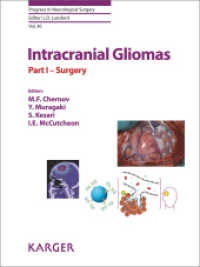- ホーム
- > 洋書
- > 英文書
- > History / World
Full Description
In the nineteenth century, French and Mexican intellectuals had a common interest in providing a groundwork for educating better citizens in response to social crises. There were political and philosophical controversies regarding science and technology in this environment between spiritualists (humanists) and positivists (scientists).. Power and knowledge were intertwined in these controversies. Another objective of the book is to show that controversies can be seen as a dispute between two cultures between those in favor of science and technology and those in favor of philosophy and the humanities. Their continuous arguments articulated a third culture based on an intertwining of power and knowledge. This articulation had an implicit dimension in which philosophy, science, and technology had to interact to enrich the political potential of the human experience of thinking. They were able to grasp a mix or a synthesis that conceptualized the power of a metaphysical artifact in which philosophy, science, and technology belong to the same culture, where politics helps invite dialogue between different cultural, religious, and political perspectives.
Contents
Acknowledgments
Introduction
Part I: The French Political Philosophy of Science in the Late Nineteenth Century: Eclecticism, Positivism, and Political Romanticism
Chapter I. The Philosophical Eclecticism of Victor Cousin
Chapter II. The Engineers' Paradise: Saint-Simon, Auguste Comte, and Pierre Leroux
Chapter III. The Philosophical and Political Debates of the Spiritualists, the Scientists, and the Positivists
Part II: Philosophical-Political Debates in Mexico: Positivism and Spiritualism
Chapter IV. The Paradise of the Physicians: The Mexican Positivism of Gabino Barreda.
Chapter V. The Political Spiritualism of José María Vigil and the Political and Historical Debate with Sierra
Chapter VI. The Philosophical Debates over the Logic Textbook
Conclusion
Bibliography
About the Author







